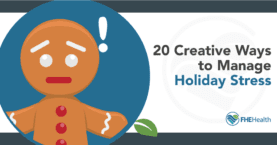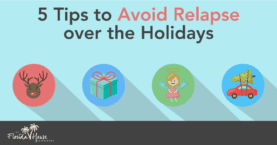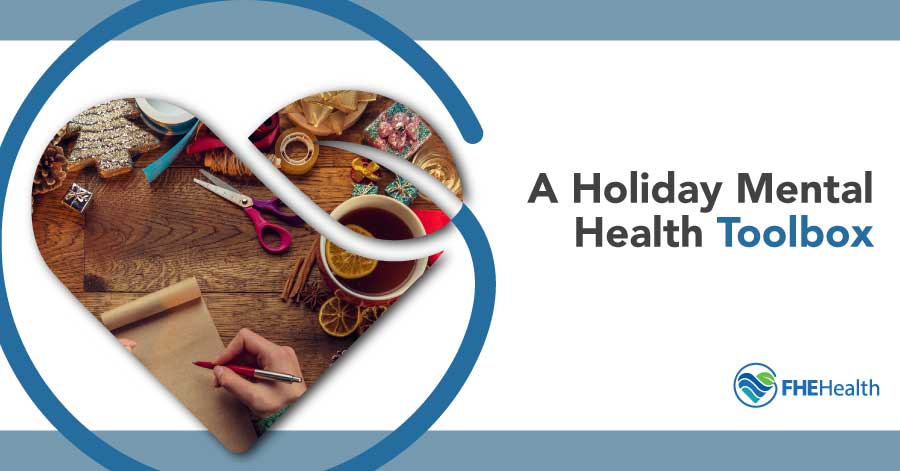
Struggling with mental health and the holidays go hand in hand for many people. Our mental health toolbox can help you manage your mental health during this challenging holiday season.
The holidays are meant to be a time to bring people together, to celebrate and to give thanks. But for someone struggling with addiction or other mental health complications, it’s not that easy.
Managing your mental health during holidays can be a challenge to your overall well-being. If you don’t take steps now to protect your mental health and do so throughout the holiday season, you may find yourself overwhelmed, which can put your recovery in jeopardy.
Treatment can begin quickly and discretely, get started now Whether you or a loved one is struggling with addiction, one of the first steps to handling mental health during holidays is knowing what the risks are. Relapse at this time of the year is a real concern for many because of the constant exposure to triggers. Those struggling with addiction are more likely to take a drink or use their drug of choice. A key part of recovery is removing these triggers from day-to-day life, but the holidays bring about some situations when triggers are constant. Being in early recovery can exacerbate these problems. Statistics indicate that a person within 3 years of ceasing drug or alcohol use runs the highest risk of relapse, while those more than 3 years out are less likely to relapse. Still, everyone can benefit from this guide to holiday support for mental health. One of the keys to your success is understanding what your triggers are. What makes you more likely to use again? There are many things that can qualify — here are a few examples. Take the time to focus on what you can do to remove yourself from these high-risk situations. It’s important in recovery to prioritize your mental health and well-being, particularly during the holidays. Treatment can begin quickly and discreetly, get started now Everyone in any stage of recovery should have a counseling team to help them. Even if you’re busy, make these appointments. You also want to be sure you’re attending all your group therapy sessions. Going to these obligations isn’t just keeping a valuable routine — you can also discuss your feelings and the stressors you experience this time of the year. If you’re feeling lonely or isolated, it’s important to remember that you’re not the only one. Even if you’re still seeing your therapist or counselor regularly, you may need additional holiday support when it’s difficult to cope. Look around for additional outlets to supplement your sessions. There are plenty of local support groups that deal with general loneliness, and you even may be able to find a group that brings together people who struggle with the holiday season. It’s nothing to be ashamed of. Believe it or not, eating well during the holidays isn’t always easy to do. However, you may know the importance of boosting your health through nutrition. During recovery, your body needs good nutrition in order to thrive. This often means ensuring you’re taking in ample nutrients. Use this time to get your health back in check. You don’t want to eat too many of the wrong foods and find yourself struggling with weight and negative emotions. For many, there’s a sense of guilt during this time period. You may not even want to talk about it, but you feel guilty about the world you left behind. You’re doing good for yourself, but that doesn’t mean others can’t do the same. This may be a good time for you to open your heart to some volunteer work. Of course, you don’t want to put yourself in the same place you used to be, so avoid the areas, people and experiences where you commonly used your drug of choice. However, you can still find a way to give back. Volunteer at a food bank. Donate a few gifts or coats to those in need. Doing some little things like this can not only help others but can also help you feel good about yourself. Many people in recovery are fully aware of the stress and anxiety that will come when they face the annual holiday season. Yet they still do it because it’s common to feel that seeing family over the winter holidays is something a person just has to deal with. While learning to reduce stress and how to tolerate stressful situations is a virtue, that doesn’t mean you should subject yourself to anything that will present a legitimate health risk to you. Learn to say “no” — if your family or friends truly support you, they’ll understand you’re doing what’s best for you. Many people count on holiday traditions to provide a sense of structure and predictability to their lives, even during times of uncertainty. Having something fun and festive to look forward to each year that you can plan and prepare for can be comforting. They’re a great way to build positive memories to look back on year after year. If you don’t have any traditions of your own, it’s never too late to create new ones that will bring you joy this holiday season. Maintaining social connections with loved ones — even virtually — can help boost your mental health during holidays. Loneliness can worsen feelings of depression, so make sure you’re not isolating yourself even if you’re struggling. Our devices are a great way to keep us connected, but their highly addictive nature disconnects us from things that matter, like living in the moment. Limit mindless screen time and social media use during the holidays, which can lead to feelings of inadequacy when the pressure for perfection is at its peak. Establish clear boundaries for when and how you use technology, and shut down screens at least an hour before bedtime to improve sleep quality. Even if you’re down in the dumps, it’s essential to step back and acknowledge the things you’re grateful for — no matter how small they seem. Simply taking stock of the good things you have in your life can help break you out of a bad mood. If some of those good things are people you care about, take the time to reach out and let them know how much you appreciate their support and connection. By learning how to reframe your mindset from the negative to the positive, you’ll cultivate a healthier, more balanced outlook that will improve your overall well-being. Treatment can begin quickly and discretely, get started now A big part of holiday mental health is being aware of what’s happening to you throughout this period. Take note of the following to know when a problem is surfacing: These are all indicators something needs to change. Pay attention to the way you act and feel as the holidays approach. If you’re not sure why you’re feeling the way you are, speak with your support team to discover any underlying problems. Maintaining mental health during holidays is never easy, but you’ll get stronger with every year. Over time, you can reframe it as a time to rebuild your life and not something to dread. The expert care team at FHE Health can support you in renewing your commitment to living a clean life. Reach out today to set your goals for long-term success. Ready to start? More questions about treatment? Kristina Robb-Dover is a content manager and writer with extensive editing and writing experience... read more The FHE Health team is committed to providing accurate information that adheres to the highest standards of writing. If one of our articles is marked with a ‘reviewed for accuracy and expertise’ badge, it indicates that one or more members of our team of doctors and clinicians have reviewed the article further to ensure accuracy. This is part of our ongoing commitment to ensure FHE Health is trusted as a leader in mental health and addiction care. If there are any concerns about content we have published, please reach out to us at marketing@fhehealth.com.Start Treatment Now
What are the Mental Health Risks During the Holidays?
Know Your Triggers
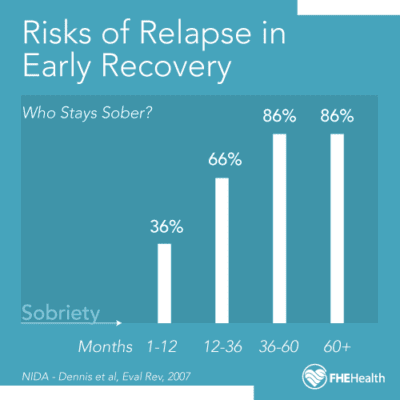
Need Help?
How Can You Maintain Your Mental Health During the Holidays?
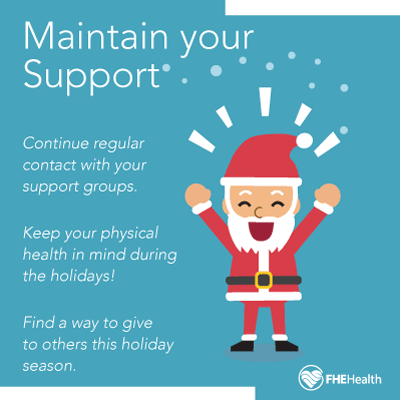 There’s a lot to do during the holidays. At any stage of your recovery, you may find yourself immersed in holiday activities. You may be decorating a tree, you may be visiting with loved ones more often — for some, it means working longer hours. No matter what’s happening, you have to work that much harder to maintain your mental health during the holidays. How do you do this?
There’s a lot to do during the holidays. At any stage of your recovery, you may find yourself immersed in holiday activities. You may be decorating a tree, you may be visiting with loved ones more often — for some, it means working longer hours. No matter what’s happening, you have to work that much harder to maintain your mental health during the holidays. How do you do this?Visit Your Team Frequently
Look for New Support Options If You Need Them
Focus on Your Nutrition
Find a Way to Give Back
Don’t Be Afraid to Put Yourself First
Try Out a New Tradition or Two
Stay Connected
Use Technology Mindfully
Practice Gratitude
Start Treatment Now
Deal With What Happens When It Happens
Begin your recovery today
![]()
About Kristina Robb-Dover
Footer
Functional
Always active
Preferences
Statistics
Marketing
